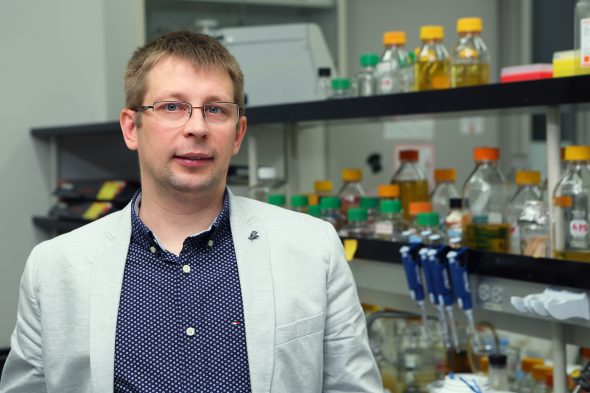2018 Researcher of the Year Yury Polikanov
Yury Polikanov
Rising Star
Basic Life Sciences
Biological scientist Yury Polikanov is focused on studying the ribosome, a protein-producing cellular structure predominantly made of RNA found in all living cells, including humans and bacteria.
“The ribosome is the most fundamental ‘molecular machine’ in the cell,” said Polikanov, assistant professor of biological sciences at the UIC College of Liberal Arts and Sciences. “Through a process called translation, the ribosome decodes the genetic information and produces thousands of different proteins. In turn, those proteins control almost every function of the cell.”
Polikanov’s lab is unique in combining the use of X-ray crystallography techniques with other multidisciplinary approaches to look at the atomic-level structures of ribosomes from bacteria, a technique he learned and helped develop as a post-doctoral researcher at Yale University.
This structural information, he said, is critical for understanding how some types of antibiotics work to fight infection and how they can be improved to combat drug-resistant pathogens, which the Centers for Disease Control and Prevention call one of the biggest public health challenges of our time and the World Health Organization says are an increasingly serious threat.
Since joining the UIC faculty in 2015, Polikanov’s research has provided novel insights into the mechanisms of action of both commonly used and newly discovered antibiotics, including new classes of ribosome-inhibiting peptides. One new class of antibiotics, for example, are called odilorhabdins, or ODLs.
ODLs are produced by symbiotic bacteria found in soil-dwelling nematode worms that colonize insects for food. The bacteria help to kill the insect and, importantly, secrete the antibiotic to keep competing bacteria away.
Through his research, Polikanov and his colleagues were the first to identify exactly how ODLs work – by binding to the bacterial ribosomes and disrupting their ability to interpret and translate genetic code during protein synthesis.
“Like many clinically useful antibiotics, ODLs work by targeting the ribosome,” said Polikanov, who is also an assistant professor of medicinal chemistry and pharmacognosy at the UIC College of Pharmacy, “but ODLs are unique because, as we discovered, they bind to a place on the ribosome that has never been used by other known antibiotics.”
This, he said, makes ODLs a promising clinical compound for drug-resistant or hard-to-treat bacterial infections.
Among his many goals, Polikanov hopes to understand more about the ribosome of drug-resistant bacteria that would help to develop clinically effective therapies; but he knows he cannot do it alone.
“Any success I have I owe to the UIC students, postdocs and colleagues who work with me now, as well as my current collaborators at other universities around the world who also study the same problems in their labs and who share their knowledge with me,” Polikanov said. “I am very honored and proud to be among this group of researchers recognized by UIC and I am grateful for the support I’ve been given by my collaborators and the departments.”
Polikanov, who had an early interest in science, won a number of national science competitions in Russia, his home country, during his high-school years, and received third prize at the International Biology Olympiad in 1999. He is a graduate of Lomonosov Moscow State University, in Moscow, where he earned a bachelor’s degree and a master’s degree in biochemistry and molecular biology, and was selected as the best student of the year in 2004. He earned a doctoral degree in cellular and molecular pharmacology from Rutgers University, in New Brunswick, New Jersey.
While this is Polikanov’s first faculty appointment, in his short tenure, he has published a number of high-profile papers in high-impact scientific journals, including Molecular Cell, Nature Chemical Biology and Nucleic Acids Research. To date, he is a leading author on 10 of these studies and the recipient of research funding from the National Institutes of Health and a number of international pharmaceutical companies.

